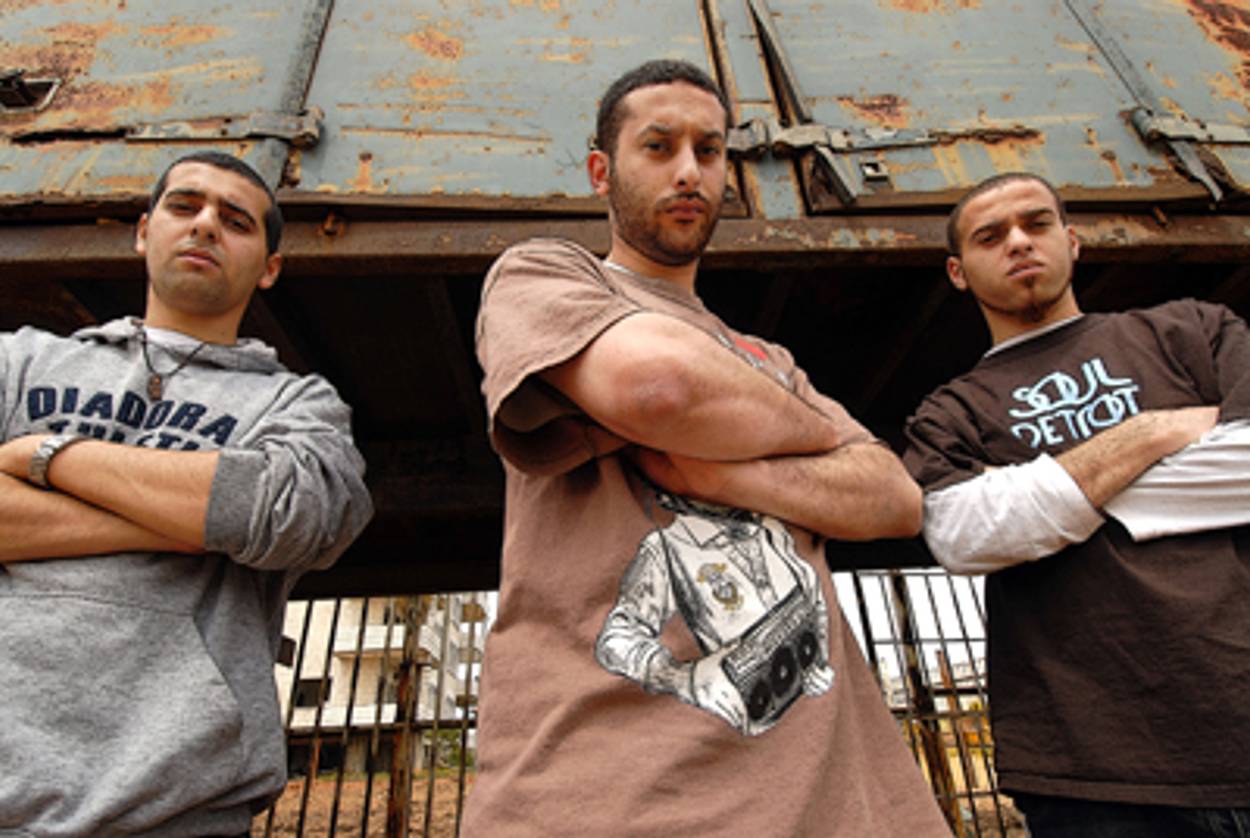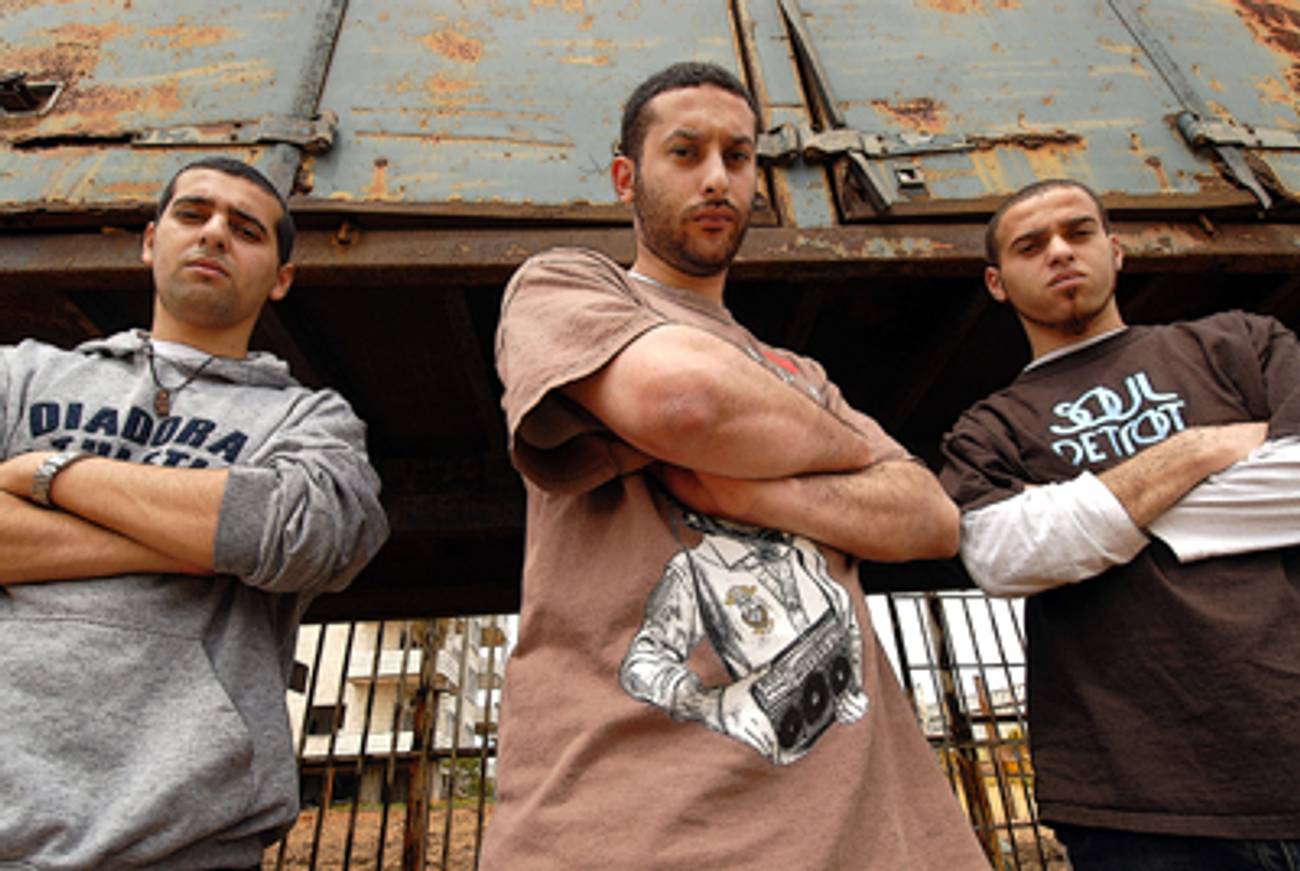Who’s the Terrorist?
The leading Palestinian hip-hop group finds an unlikely fan base




When the members of DAM, the leading Palestinian hip-hop group, travel to Europe for their frequent performances there, they fly out of Ben Gurion Airport on their Israeli passports. Group leader Tamer Nafer, 27, his brother Suhell, 23, and their friend Mahmoud Jreri, 24, were born and raised in the impoverished, drug-infested inner city of Lod, a mixed Arab-Jewish town just south of Tel Aviv, where they still live. Israeli Jews refer to them as Arab-Israelis, but, like many of Israel’s 1.5 million Arab citizens, they prefer the term “1948 Palestinians.” Over the last eight years DAM, who rap in both Arabic and Hebrew, has built up a fan base around the Middle East and Europe, inspiring a wave of young Arab hip-hop artists in Israel, Gaza, the West Bank and Jordan. Now, however, it looks as though DAM may be finding a niche audience among Israeli hipsters from the Jewish sector of the population as well.
Over the past year, DAM has performed three times at Levontin 7, currently Tel Aviv’s main venue for cutting-edge music performances, to mixed Arab and Jewish audiences of about 200. In January 2007, when DAM performed at Café Barzilay—a much more mainstream venue—fans lined up outside the door for a show that started at midnight on a weeknight. A few weeks earlier, music critic Shai Fogelman had raved about the band in a three-page spread in Time Out Tel Aviv. “Their CD sounds exactly the way a high-quality hip-hop album is supposed to sound—exploding with aggressive energy…on the one hand, with complex musical compositions and sophisticated production on the other hand. Samples from traditional Arabic songs…integrate perfectly with the heavy bass and insistent beat of contemporary Western hip-hop…. anyone who thinks that DAM is simply a ‘curiosity’ is destined to be surprised when they explode in our faces.”
But though DAM—an acronym for Da Arabic MC’s—means “blood” in both Hebrew and Arabic, the name isn’t meant to indicate a violent stance. “I have a lot of rage, but I express it with a microphone, not a weapon,” says Nafer, in Hebrew. “We 1948 Palestinians see the conflict through a different lens. We live a double life, and I understand the language of both sides. That is why I am writing songs in Hebrew now, so I can explain the Palestinian side to the Israelis.” Tamer is passionate, articulate and charismatic; he believes that he can find an Israeli audience beyond the so-called Arab sector, although he agrees that he is unlikely to become part of the mainstream music scene. “Mainstream Israeli society is too closed,” he said. “It is not open to the narrative of the other side.”
Daniel Sarid, the soft-spoken co-owner of Levontin 7, set a precedent in mostly Jewish Tel Aviv when he booked DAM to perform at his club. An Israeli musician who had performed with Tamer at a peace rally in Tel Aviv introduced Sarid to the band. “Tamer tried to provoke me by saying that he was ‘cool’ with Hassan Nasrallah, but he let down his guard when he saw that I wasn’t responding,” says Sarid. “The fact is that he is totally committed to coexistence. He almost never turns down a request to perform pro bono at peace rallies.” In fact, DAM’s most recent appearance at Levontin 7, in July, was a collaborative hip-hop sulha (Arabic for reconciliation) with Jewish hip-hop artists. But Sarid says emphatically that he did not book the group for political reasons. “I am a musician, and my club is not political. DAM is part of the Israeli music scene, and they are excellent hip-hop artists.” Sarid thinks DAM is unlikely to become part of the mainstream Israeli music scene, but because of their genre, rather than politics. “Hip-hop,” he says, “is not supposed to be mainstream.”
Perhaps not, but there is an Israeli hip-hop group that is a very popular part of the mainstream music scene. It is called Subliminal, which is the moniker of lead singer Kobi Shimoni. He and Tamer have a complex relationship that dates back to 2000, in the months just before the second intifada began, when they were both just starting out.
Soon after they met, the director Anat Halachmi began documenting their friendship on film. The result, Channels of Rage, won the award for best documentary at the 2003 Jerusalem Film Festival. Halachmi followed Tamer and Kobi for three years as they toured the country, performing together to small audiences and wrapping their arms around one another’s shoulders as they spoke about coexistence. But then their political opinions, which evolved against the background of the intifada, began to clash. Subliminal saw the collapse of the Oslo Accords as an expression of the Palestinians’ unwillingness to make peace. Tamer, on the other hand, identified with Palestinian suffering in the wake of the IDF’s re-occupation of the West Bank in 2002.
For a brief period, each seemed to be identifying with the extremists’ narrative on either side of the conflict. Subliminal’s message became patriotic to the point of nationalism (one of his songs was banned from the Army Radio play list for its perceived right-wing message), while in 2003 DAM released a video clip of a song called “Min Erhabi?” (“Who’s the Terrorist?”) with footage of IDF soldiers shooting at rock-throwing Palestinian youths and IDF helicopter gunships hovering over Palestinian towns. “Who’s the terrorist? / I’m the terrorist?! / How am I the terrorist when you’ve taken my land?” That clip was watched on YouTube and MySpace tens of thousands of times. It became a hit in the Arab world and is still the song most strongly identified with DAM.
Since then, though, both Tamer and Subliminal have evolved musically and softened politically. Subliminal raps about peace and lends his name to campaigns against drunk driving and teen violence. DAM raps about universal messages of social justice and performs pro bono for children in Palestinian refugee camps. But Tamer and Kobi are no longer friends, and neither thinks reconciliation is possible. In an interview for this article, Subliminal claimed he broke contact with Tamer over the issue of suicide bombers. “After the Dolphinarium bombing, Tamer said that he identified with the suicide bombers,” says Subliminal in an outraged tone, referring to the June 1, 2001, suicide bombing outside a popular Tel Aviv discotheque. Twenty-one people were killed—nearly all teenagers who were waiting to enter the discotheque—and another 120 were injured. “That means he supports terrorism.” In response, Tamer snorts derisively and says, “You see? He’s an idiot—not even worth responding to. Our collaboration didn’t end because of political reasons. It ended because the guy is beneath my level. He’s simply not very intelligent. He doesn’t even understand that hip-hop is the language of protest and anger. I never said I supported terrorism. I said I understood the rage that motivated the terrorists.”
The lyrics on DAM’s debut CD, Dedication, include statements about Palestinian suffering, but the album also covers plenty of other subjects. The song “Change Tomorrow” calls for an end to hate, for understanding between Christians, Muslims, and Jews. And one of the most moving songs, “Freedom For My Sister,” is about the discrimination experienced by women in Arab society. Lyrics like “This is from me, the man / the one who builds walls of limitation around you,” are accompanied by a woman’s haunting, wordless vocals.
Few Israeli Jews speak Arabic, although it is Israel’s second official language, and despite the fact that around half the Jewish population is ethnically rooted in Arabic-speaking countries. Nearly all the Israeli Jews who are impressed with DAM—including Fogelman and Sarid—admit readily that they are attracted to the artistry of the music rather than the lyrics. While it may be cool among Jewish Israeli hipsters to listen to Arabic hip-hop, the fact is that Arabs and Jews are listening to DAM for different reasons. “They will always be super-marginal in Israel,” says Fogelman. “It’s too difficult for most Israelis to understand their message. Maybe if they sang peace songs in Hebrew, they’d gain a mainstream audience. But then they’d lose their Arab audience.”
The accuracy of that gloomy commentary on contemporary Middle Eastern society is difficult to deny. Even Jordan and Egypt reject normalization of cultural ties with Israel. But Tamer claims those obstacles do not discourage him. “I see a spark of light right now,” he said, “And I want to bring hope.” Given his energy, passion and intelligence, perhaps he will succeed—if not as a mainstream Israeli musician, at least as a voice that provokes much-needed dialogue.
DAM will be performing on November 10, at the JCC in Manhattan, and on November 12, at Cinema Village, as part of the Other Israel Festival.
Lisa Goldman is a contributing editor at +972 Magazine and a policy analyst at New America’s National Security Studies Program. Born and raised in Vancouver, Canada, she lived for over a decade in Tel Aviv-Jaffa and now resides in Brooklyn.
Lisa Goldman is a contributing editor at +972 Magazine and a policy analyst at New America’s National Security Studies Program. Born and raised in Vancouver, Canada, she lived for over a decade in Tel Aviv-Jaffa and now resides in Brooklyn.